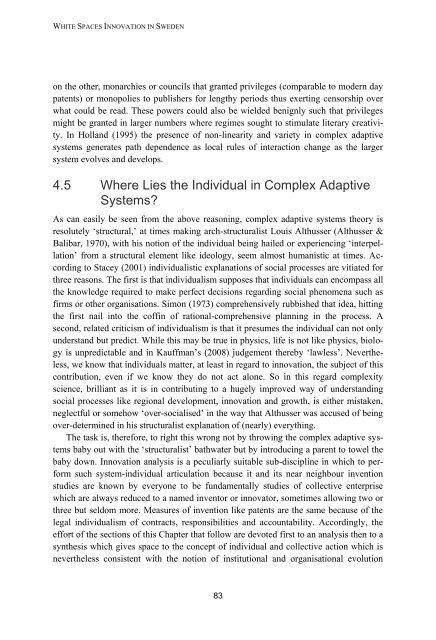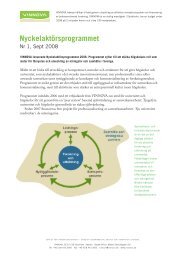White Spaces Innovation in Sweden - Innovation policy for ... - Vinnova
White Spaces Innovation in Sweden - Innovation policy for ... - Vinnova
White Spaces Innovation in Sweden - Innovation policy for ... - Vinnova
Create successful ePaper yourself
Turn your PDF publications into a flip-book with our unique Google optimized e-Paper software.
WHITE SPACES INNOVATION IN SWEDENon the other, monarchies or councils that granted privileges (comparable to modern daypatents) or monopolies to publishers <strong>for</strong> lengthy periods thus exert<strong>in</strong>g censorship overwhat could be read. These powers could also be wielded benignly such that privilegesmight be granted <strong>in</strong> larger numbers where regimes sought to stimulate literary creativity.In Holland (1995) the presence of non-l<strong>in</strong>earity and variety <strong>in</strong> complex adaptivesystems generates path dependence as local rules of <strong>in</strong>teraction change as the largersystem evolves and develops.4.5 Where Lies the Individual <strong>in</strong> Complex AdaptiveSystems?As can easily be seen from the above reason<strong>in</strong>g, complex adaptive systems theory isresolutely „structural,‟ at times mak<strong>in</strong>g arch-structuralist Louis Althusser (Althusser &Balibar, 1970), with his notion of the <strong>in</strong>dividual be<strong>in</strong>g hailed or experienc<strong>in</strong>g „<strong>in</strong>terpellation‟from a structural element like ideology, seem almost humanistic at times. Accord<strong>in</strong>gto Stacey (2001) <strong>in</strong>dividualistic explanations of social processes are vitiated <strong>for</strong>three reasons. The first is that <strong>in</strong>dividualism supposes that <strong>in</strong>dividuals can encompass allthe knowledge required to make perfect decisions regard<strong>in</strong>g social phenomena such asfirms or other organisations. Simon (1973) comprehensively rubbished that idea, hitt<strong>in</strong>gthe first nail <strong>in</strong>to the coff<strong>in</strong> of rational-comprehensive plann<strong>in</strong>g <strong>in</strong> the process. Asecond, related criticism of <strong>in</strong>dividualism is that it presumes the <strong>in</strong>dividual can not onlyunderstand but predict. While this may be true <strong>in</strong> physics, life is not like physics, biologyis unpredictable and <strong>in</strong> Kauffman‟s (2008) judgement thereby „lawless‟. Nevertheless,we know that <strong>in</strong>dividuals matter, at least <strong>in</strong> regard to <strong>in</strong>novation, the subject of thiscontribution, even if we know they do not act alone. So <strong>in</strong> this regard complexityscience, brilliant as it is <strong>in</strong> contribut<strong>in</strong>g to a hugely improved way of understand<strong>in</strong>gsocial processes like regional development, <strong>in</strong>novation and growth, is either mistaken,neglectful or somehow „over-socialised‟ <strong>in</strong> the way that Althusser was accused of be<strong>in</strong>gover-determ<strong>in</strong>ed <strong>in</strong> his structuralist explanation of (nearly) everyth<strong>in</strong>g.The task is, there<strong>for</strong>e, to right this wrong not by throw<strong>in</strong>g the complex adaptive systemsbaby out with the „structuralist‟ bathwater but by <strong>in</strong>troduc<strong>in</strong>g a parent to towel thebaby down. <strong>Innovation</strong> analysis is a peculiarly suitable sub-discipl<strong>in</strong>e <strong>in</strong> which to per<strong>for</strong>msuch system-<strong>in</strong>dividual articulation because it and its near neighbour <strong>in</strong>ventionstudies are known by everyone to be fundamentally studies of collective enterprisewhich are always reduced to a named <strong>in</strong>ventor or <strong>in</strong>novator, sometimes allow<strong>in</strong>g two orthree but seldom more. Measures of <strong>in</strong>vention like patents are the same because of thelegal <strong>in</strong>dividualism of contracts, responsibilities and accountability. Accord<strong>in</strong>gly, theef<strong>for</strong>t of the sections of this Chapter that follow are devoted first to an analysis then to asynthesis which gives space to the concept of <strong>in</strong>dividual and collective action which isnevertheless consistent with the notion of <strong>in</strong>stitutional and organisational evolution83
















